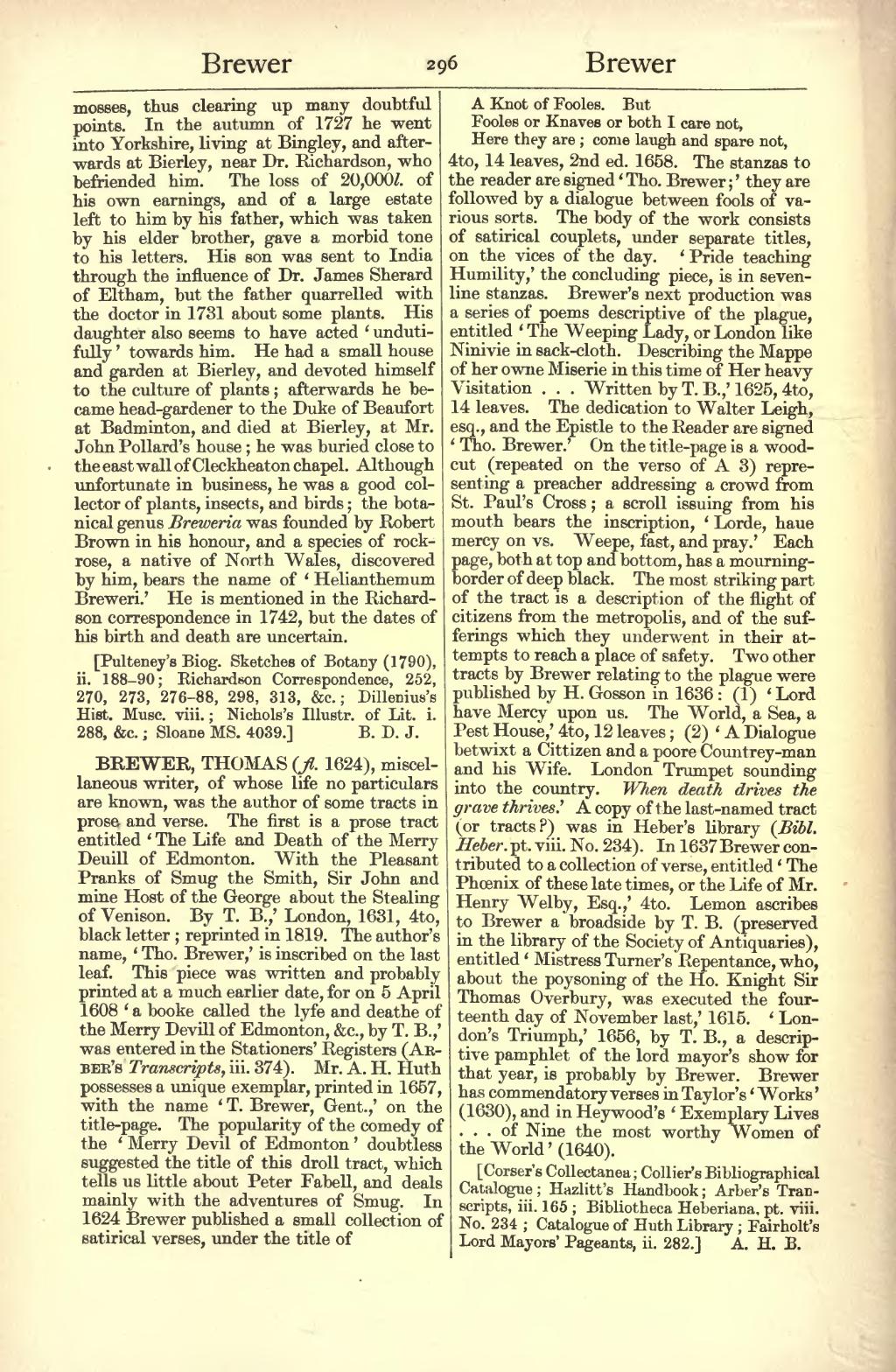mosses, thus clearing up many doubtful points. In the autumn of 1727 he went into Yorkshire, living at Bingley, and afterwards at Bierley, near Dr. Richardson, who befriended him. The loss of 20,000l. of his own earnings, and of a large estate left to him by his father, which was taken by his elder brother, gave a morbid tone to his letters. His son was sent to India through the influence of Dr. James Sherard of Eltham, but the father quarrelled with the doctor in 1731 about some plants. His daughter also seems to have acted 'undutifully' towards him. He had a small house and garden at Bierley, and devoted himself to the culture of plants ; afterwards he became head-gardener to the Duke of Beaufort at Badminton, and died at Bierley, at Mr. John Pollard's house ; he was buried close to the east wall of Cleckheaton chapel. Although unfortunate in business, he was a good collector of plants, insects, and birds ; the botanical genus Breweria was founded by Robert Brown in his honour, and a species of rock-rose, a native of North Wales, discovered by him, bears the name of 'Helianthemum Breweri.' He is mentioned in the Richardson correspondence in 1742, but the dates of his birth and death are uncertain.
[Pulteney's Biog. Sketches of Botany (1790), ii. 188-90; Richardson Correspondence, 252, 270, 273, 276-88, 298, 313, &c. ; Dillenius's Hist. Musc. viii. ; Nichols's Illustr. of Lit. i. 288, &c. ; Sloane MS. 4039.]
BREWER, THOMAS (fl. 1624), miscellaneous writer, of whose life no particulars are known, was the author of some tracts in prose and verse. The first is a prose tract entitled 'The Life and Death of the Merry Deuill of Edmonton. With the Pleasant Pranks of Smug the Smith, Sir John and mine Host of the George about the Stealing of Venison. By T. B.,' London, 1631, 4to, black letter ; reprinted in 1819. The author's name, 'Tho. Brewer,' is inscribed on the last leaf. This piece was written and probably printed at a much earlier date, for on 5 April 1608 'a booke called the lyfe and deathe of the Merry Devill of Edmonton, &c., by T. B., was entered in the Stationers' Registers (Arber's Transcripts, iii. 374). Mr. A. H. Huth possesses a unique exemplar, printed in 1657, with the name 'T. Brewer, Gent.,' on the title-page. The popularity of the comedy of the 'Merry Devil of Edmonton' doubtless suggested the title of this droll tract, which tells us little about Peter Fabell, and deals mainly with the adventures of Smug. In 1624 Brewer published a small collection of satirical verses, under the title of
- A Knot of Fooles. But
- Fooles or Knaves or both I care not,
- Here they are ; come laugh and spare not,
4to, 14 leaves, 2nd ed. 1658. The stanzas to the reader are signed 'Tho. Brewer ;' they are followed by a dialogue between fools of various sorts. The body of the work consists of satirical couplets, under separate titles, on the vices of the day. 'Pride teaching Humility,' the concluding piece, is in seven-line stanzas. Brewer's next production was a series of poems descriptive of the plague, entitled 'The Weeping Lady, or London like Ninivie in sack-cloth. Describing the Mappe of her owne Miserie in this time of Her heavy Visitation . . . Written by T. B.,' 1625, 4to, 14 leaves. The dedication to Walter Leigh, esq., and the Epistle to the Reader are signed 'Tho. Brewer.' On the title-page is a wood-cut (repeated on the verso of A 3) representing a preacher addressing a crowd from St. Paul's Cross ; a scroll issuing from his mouth bears the inscription, 'Lorde, haue mercy on vs. Weepe, fast, and pray.' Each page, both at top and bottom, has a mourning-border of deep black. The most striking part of the tract is a description of the flight of citizens from the metropolis, and of the sufferings which they underwent in their attempts to reach a place of safety. Two other tracts by Brewer relating to the plague were published by H. Gosson in 1636 : (1) 'Lord have Mercy upon us. The World, a Sea, a Pest House,' 4to, 12 leaves ; (2) 'A Dialogue betwixt a Cittizen and a poore Countrey-man and his Wife. London Trumpet sounding into the country. When death drives the grave thrives. ' A copy of the last-named tract (or tracts?) was in Heber's library (Bibl. Heber. pt. viii. No. 234). In 1637 Brewer contributed to a collection of verse, entitled 'The Phoenix of these late times, or the Life of Mr. Henry Welby, Esq.,' 4to. Lemon ascribes to Brewer a broadside by T. B. (preserved in the library of the Society of Antiquaries), entitled 'Mistress Turner's Repentance, who, about the poysoning of the Ho. Knight Sir Thomas Overbury, was executed the fourteenth day of November last,' 1615. 'London's Triumph,' 1656, by T. B., a descriptive pamphlet of the lord mayor's show for that year, is probably by Brewer. Brewer has commendatory verses in Taylor's 'Works' (1630), and in Heywood's 'Exemplary Lives . . . of Nine the most worthy Women of the World' (1640).
[Corser's Collectanea ; Collier's Bibliographical Catalogue ; Hazlitt's Handbook ; Arber's Transcripts, iii. 165 ; Bibliotheca Heberiana, pt. viii. No. 234 ; Catalogue of Huth Library ; Fairholt's Lord Mayors' Pageants, ii. 282.]
